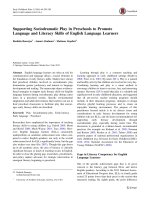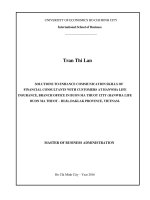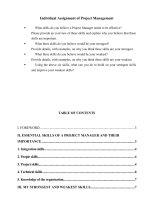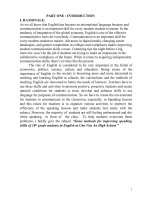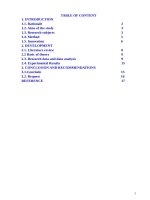individual assignment managerial skills of danny wegman
Bạn đang xem bản rút gọn của tài liệu. Xem và tải ngay bản đầy đủ của tài liệu tại đây (758.84 KB, 12 trang )
<span class="text_page_counter">Trang 1</span><div class="page_container" data-page="1">
<b>MANAGERIAL SKILLS OF DannyWegman </b>
Subject: Introduction to ManagementStudent’s Name: NGUYEN THI LINH
Student’s Code: HS 176214Class: IB1806
Lecturer: QUANG TRUNG HIEU
Table of Contents
<b>1 | P a g e</b>
</div><span class="text_page_counter">Trang 2</span><div class="page_container" data-page="2"><b>top-2 | P a g e</b>
</div><span class="text_page_counter">Trang 3</span><div class="page_container" data-page="3">communication skills, diagnostic skill, and decision-making skills, each level of manager will choose which skills should be given priority to focus on. Following the introduction part, I would demonstrate the managerial qualities of the CEO of a large-scale company.
The overall purpose of this assignment is to develop the student's ability to identify and define a problem and to conduct a literature review based on subject theory. The assignment looks at both sides of the real experience of Danny Wegman who is the CEO of Wegmans Food Markets, to the analysis and evaluation of his management skills.
<b>Information of manager:</b>
<b>3 | P a g e</b>
</div><span class="text_page_counter">Trang 4</span><div class="page_container" data-page="4">
<b>Position </b> Chairman, Wegmans Food Markets Inc.
<b>Education</b> Bachelor of President & Fellows of Harvard College.
</div><span class="text_page_counter">Trang 5</span><div class="page_container" data-page="5">II. Literature Review & Critical Analysis:
<b>1. Technical skills: </b>
According to, Fundamentals of Management (Ricky W.Griffin ,2019) , Technical skills, The skills necessary to accomplish or understand the specific kind of work done in an organization, which are necessary to accomplish or understand the specific kind of work done in an organization. Technical skills are especially important for first-line managers. These managers spend much of their time training their subordinates and answering questions about work-related problems. If they are to be effective managers, they must know how to perform the tasks assigned to those they supervise. While Reed Hastings now spends most of his time dealing with strategic and management issues, he also keeps abreast of new and emerging technologies and trends that may affect Netflix.
Part of what makes Wegmans successful is the company’s attention to its employees’ needs at all levels of Maslow’s hierarchy. The company pays above-market wages (the souschef at a Pittsburgh store used to work for Thomas Keller’s French Laundry in Napa Valley,and talent like that doesn’t come cheap), and until 2003, Wegmans paid 100 percent of its employees’ medical insurance premiums (physiological needs). Wegmans’ most comparable competitor has a turnover rate of about 19 percent, which doesn’t even come close to Wegmans’ 5 percent. More than half of Wegmans’ store managers began working there in their teens (safety needs).
Because employees stay so long, the Wegmans culture has become stronger and moreingrained over time. Edward McLaughlin, director of Cornell’s Food Industry ManagementProgram, says, “When you’re a 16-yearold kid, the last thing you want to do is wear a geeky shirt and work for a supermarket. But at Wegmans, it’s a badge of honor. You are not a geeky cashier. You are part of the social fabric,” (social needs).1 Sara Goggins, a 19-year-old college student, was recently complimented on the display she helped prepare for the store’s French-inspired patisserie—by Danny Wegman himself (esteem needs). Sara keeps a photo of her and Danny Wegman behind the counter. Maria Benjamin used to bake “chocolate meatball cookies” to celebrate coworkers’ birthdays. They were so popular that she asked Danny Wegman if the store would sell them in the bakery department. He said
<b>5 | P a g e</b>
</div><span class="text_page_counter">Trang 6</span><div class="page_container" data-page="6">yes, and it did. Employees like Sara and Maria are routinely recognized for their contributions to the company (esteem needs). Wegmans has spent over $54 million for college scholarships to more than 17,500 full- and part-time employees over the past 20 years. Top management thinks nothing of sending store department managers on training expeditions. A cheese manager might take a 10-day trip to visit and study cheesemakers in London, Paris, and Italy; a wine manager might take a company-sponsored trip through the Napa Valley (self-actualization needs).2 As you can see from this extended example, Wegmans works hard to meet its employees’ needs at all levels.
•<b>Difficulties: </b>
Danny Wegman spent a large sum of money to retain employees especially young and promising employees. however, the question is, if these young employees find out that their abilities far exceed the amount of money they are hired, what will Danny do to keep them? not only that, the salary increase for an individual will affect other individuals, this has not yet been offered a solution.
Danny's technical skills are well worth learning, from selecting employees to recommending employees, not only retaining potential employees, which makes the company stronger than ever.
<b>2. Conceptual skills: </b>
According to, Fundamentals of Management (Ricky W.Griffin ,2019), conceptual skills , The manager’s ability to think in the abstract, depend on the manager’s ability to think in the abstract. Managers need the mental capacity to understand the overall workingsof the organization and its environment, to grasp how all the parts of the organization fit together, and to view the organization in a holistic manner. This ability allows them to thinkstrategically, to see the “big picture,” and to make broad-based decisions that serve the overall organization. Reed Hastings’s idea to extend the payment model used by health
<b>6 | P a g e</b>
</div><span class="text_page_counter">Trang 7</span><div class="page_container" data-page="7">clubs to the video rental market came from his strong conceptual skills.
Gerard Q. pierce is the company's vice president Of human resources. He leads a 200- member HR department and reports to CEO Danny Wegman. He believes that what sets Wegmans apart in terms of its HR practices is the emphasis it puts on taking care of both its employees and customers. The company devotes significant resources to improving its recruiting and employee development processes by researching the needs and desires of its employees the same way it researches the needs of its customers. Prospective hires who "have a propensity to serve" and excellent interpersonal skills are the type of people the HR team recruits. Pierce notes that in many companies HR executives don't have access to top management but, at Wegmans, it's a management practice that has been part of the strategic vision.
The company has been recognized for its commitment to diversity, employing people with disabilities and community service. Wegmans received a Presidential Point of Light award in 1991 for its Hillside Work Scholarship Connection, created in 1987 to help at-risk youth stay in school, achieve academically and learn the skills to hold a job.
<b>• Difficulties:</b>
Mr Danny's vision is vast, but this doesn't widen the gap between him and his staff,but they are even more dedicated to the job, it is almost impossible to see what remains in this organisation.
Danny 's conceptural skill is truly impressive and his experience in management has helped the company greatly. in addition to strengthening relationships to strengthen the company.
<b>3. Interpersonal skills:</b>
According to, Fundamentals of Management (Ricky W.Griffin ,2019), The ability to communicate with, understand, and motivate both individuals and groups is interpersonal skills, managers spend considerable time interacting with people both inside and outside the
<b>7 | P a g e</b>
</div><span class="text_page_counter">Trang 8</span><div class="page_container" data-page="8">organization. For obvious reasons, then, they also need interpersonal skills—the ability to communicate with, understand, and motivate both individuals and groups. As a manager climbs the organizational ladder, he or she must be able to get along with subordinates, peers, and those at higher levels of the organization. Because of the multitude of roles that managers must fulfill, a manager must also be able to work with suppliers, customers, investors, and others outside the organization.
Wegmans Food Markets, a family-owned East Coast chain with more than 70 outlets in five states, prides itself on its commitment to customers, and it shows: It (U of C, 6.64) ranks at the top of the latest Consumer Reports survey of the best national and regional grocery stores. Wegmans rates especially high on service, and although such amenities as sushi stations, crab-cake counters, kosher delis, and Thai and Indian buffets drive up costs, the chain also keeps a close eye on prices. In fact, back in November 2008, as the economy continued to sink into the reces-sion, Wegmans announced what amounted to a price war with itself by promising to cut prices on many of its products: Bread went down by 17 percent and pork by 26 percent, and Wegmans claims to have saved customers $20 million. “During difficult times like these,” explains Danny Wegman, “it’s okay with us if we make a little less money.”
But commitment to customers is only half of Wegmans’ overal strategy, which call for reaching its customers through its employees. “How do we differentiate ourselves?” asks Wegman, who then proceeds to answer his own question: “If we can sell products that require knowledge in terms of how you use them, that’s strategy. Anything that requires knowledge and service gives u a reason to be.” That’s the logic behind one of Carol Kent’s recent assignments—one that she under-standably regards as a perk: Wegmans sent her to Italy to conduct a personal study of Italian cheese. “We sat with the families” that make the cheeses, she recalls, and “broke bread with them. It helped me understand that we’re not just selling a piece of cheese. We’re selling a tradition, a quality.”
Kent and the employees in her department also enjoy the best benefits package
<b>8 | P a g e</b>
</div><span class="text_page_counter">Trang 9</span><div class="page_container" data-page="9">in the industry, including fully paid health insurance. And that includes part-timers, who make up about two-thirds of the company’s workforce of more than 37,000. In part, the strategy of extending benefits to this large segment of the labor force is intended to make sure that stores have enough good workers for crucial peak periods, but there’s no denying that the costs of employee-friendly policies can mount up. At 15 to 17 percent of sales, for example, Wegmans’ labor costs are well above the 12 percent figure for most supermarkets. But according to one company HR executive, holding down labor costs isn ’t necessarily a strategic priority: “We would have stopped offering free health insurance [to part-timers] a long time ago,” she admits, “if we tried to justify the costs.”Besides, employee turnover at Wegmans is about 6 percent—a mere fraction of an industry average that hovers around 19 percent (and that, for part-timers, can approach 100 percent). And this is an industry in which total turnover costs have been known to outstrip total annual profits by 40 percent. Wegmans employees tend to be knowledgeable because about 20 percent of them have been with the com-pany for at least 10 years, and many have logged at least a quarter century. Says one 19-year-old college student who works at an upstate–New York Wegmans while pursuing a career as a high school history teacher: “I love this place. If teaching doesn’t work out, I would so totally work at Wegmans.” Edward McLaughlin, who directs the Food Industry Management Program at Cornell University, understands this sort of attitude: “When you’re a 16-year-old kid, the last thing you want to do is wear a geeky shirt and work for a supermarket,” but at Wegmans, he explains, “it’s a badge of honor. You’re not a geeky cashier. You ’re part of the social fabric.”
As in conceptural skills, for example, Danny has used HR boards effectively to make most employees want to stick with the company for a long time, which will be difficult when employees stick with a position for too long without the increase.
<b>9 | P a g e</b>
</div><span class="text_page_counter">Trang 10</span><div class="page_container" data-page="10">Danny Wegman also displays characteristics of Systems Intelligence as a leader. Leaders who display System Intelligence "can see the bigger picture and understand how the different components of the system interconnect and behave over time' (Conscious Capitalism). He shows SYQ when he tries to understand the lives of his customers and howhe can make their life easier "Our customers don’t know what they’re going to want; they have a challenging life like all of us do and it’s our job to figure out what will help them do a better job with their life, whether it’s health, whether it’s convenience, whether its value. And so following that philosophy of trying to know where your customer is going has been
<b>10 | P a g e</b>
</div><span class="text_page_counter">Trang 11</span><div class="page_container" data-page="11">a lot of fun" (Danny Wegman). Wegmans has had a clear reflection of this concept of "knowing what the customer wants" by offering many services such as, a child care center, a floral shop, a cafe, a pharmacy, personal shoppers, etc. By offering these services, each in some way is to make it so customers' lives are easier, they can now do multiple things at once while at Wegmans, such as fill prescriptions, let their kids play while parents shop, grab flowers, and get dinner to-go for all those busy people out there who simply don't havetime to cook. Overall, by offering all of these services, Wegmans has become one of the most successful companies in North America. Danny Wegman was able to see the bigger picture of what a supermarket should be and was successful because of that.
York: Gellert Publ.
<b>11 | P a g e</b>
</div><span class="text_page_counter">Trang 12</span><div class="page_container" data-page="12"><b>12 | P a g e</b>
</div>
